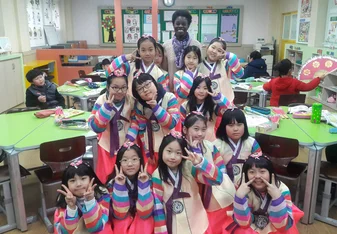Should You Teach Abroad in China, Japan, or South Korea?
Teaching English in East Asia can definitely be a life-changing experience! However, choosing which country is right for you is tough. Here are the top things to consider when choosing between teaching in China, Japan, and South Korea.
TLDR 👀
- To teach in China, Japan, and South Korea, teachers are expected to be from one of the big English speaking countries, as well as have a Bachelor's degree, clean criminal record, and be less than 60 years old.
- Your salary will greatly depend on your amount of teaching experience, your qualifications, and the type of school you’re teaching at. Japan, however is the most expensive country to teach in.
- You can expect competition when applying to teach in China, Japan, and South Korea. While China has less competition compared to South Korea and Japan, if you want to raise your chances of getting hired in any of these countries, it's recommended to get TEFL certified, or at least have 2 years of teaching experience.
- No matter which country you decide to teach in, you're guaranteed to see gorgeous sights, eat delicious food, and embark on a memorable adventure!

If you’re planning to teach abroad, China, Japan, and South Korea are fantastic options to choose from, but making the decision can be a challenging one! The salaries are high, the sights and culture are mesmerizing, and there are many different types of teaching jobs (for various skill levels!) to choose from. One big question remains -- what country is right for you?
What are the qualifications?

Knowing what qualifications you'll need to meet is a first great step for beginning your research! The requirements to teach in China, Japan, and South Korea are actually all pretty similar. We've broken them down below.
Must-haves:
- Be a native English speaker from an approved English-speaking country (countries include the United States, Canada, the United Kingdom, Ireland, New Zealand, South Africa, or Australia)
- Bachelor’s degree (in any major)
- Clean criminal record
- Be younger than 60 years old (men) or 55 years old (women)
Nice to have:
- TEFL/TESOL/CELTA certificate a degree in teaching
- Master’s in teaching English
What’s the salary and cost of living like?
In China, South Korea, and Japan, your salary will greatly depend on your amount of teaching experience, your qualifications, and the type of school you’re teaching at.
Living in China

- Average Salary: $1500 - $4700 USD/month (based on experience & credentials)
- Cost of Living: $1,000 per month
- Rent: $200 - $700 (housing is typically included by program)
- Food: $100
- Transportation (monthly pass): $30 - $50
- Typical Benefits: Free housing, flight reimbursement, visa assistance, health insurance, Chinese lessons, paid vacation
With the low cost of living and long list of benefits, your teaching salary in China could definitely allow you to earn a good chunk of cash. Although it’s not as much as having a job here in the US, teaching in China will give you an opportunity to immerse yourself in the culture, explore the country, try new foods, and see new sights, all while earning money. Sounds like a win-win to us!
Living in Japan

- Average salary: $1,700 - $5,000 USD/month (depending on job type)
- Cost of Living: $1,500-$2,000 per month
- Rent: $500 - $700 (rent is usually covered by program)
- Food: $100 (depends on how much you cook or eat out)
- Transportation (monthly pass): $80
- Typical Benefits: Accommodation, flight reimbursement, visa assistance, health insurance, teacher training, contract completion bonus, transportation stipend
How much money you will earn and save while teaching in Japan heavily depends on your job type, your location, and the kind of lifestyle you choose to live while abroad. Teaching salaries in Japan are typically higher than in other countries, but the cost of living, especially in a metropolitan area, can get quite high.
However, practicing budgeting tactics like eating street foods at night markets versus dining at expensive restaurants, taking public transportation versus private cabs, and enjoying affordable local activities can be a great way to save money and really enjoy the local culture. We won’t judge if you do decide to splurge every once in a while or treat yourself to an onsen day to relax, we totally understand!
Living in South Korea

- Average Salary: $1,350 - $3,100 USD/month (depending on the institution)
- Cost of Living: $900-$1000 per month
- Rent: $400-$600 (housing is typically included by program)
- Food: $150-$200
- Transportation (monthly pass): $30-$50
- Typical Benefits: Free housing, flight reimbursement, visa assistance, health insurance, settlement allowance, contract renewal bonus, paid vacation
In South Korea, there are 4 different types of institutions you can teach at: public schools (EPIK), hagwons (private academies), universities, and international schools. How much you earn will depend on the school type, as well the city you teach in.
Teachers teaching with the EPIK (English Program in Korea) (internal:node/39582) program or teaching in a hagwon, can earn anywhere from $1700-$2300. If you’re looking to earn a higher salary, you can opt for teaching at a university, but guaranteeing a placement at a university can be difficult. Landing the role is considered to be more competitive, since teachers at universities are allowed more freedom, teach to more mature students, have less teaching hours, and can enjoy up to four months’ vacation.
Read more: How Much Money Can You Save Teaching Abroad?
What is the teaching environment like in China, Japan, and South Korea?

Whether you're teaching in China, Japan, or South Korea, the teaching environment can vary and usually depends on many different factors, like the ages of your students, or even the time of day that you're teaching them.
A common expectation many foreign teachers have when they prepare to teach children in East Asia, is that the students will be more disciplined and academics-focused, compared to students in the US. While it is true that the students in East Asia are used to more strict classroom environments, it still all comes down to the personalities of your students and the type of teacher you are.
Alex, a teacher who taught abroad in Japan, noticed varying levels of enthusiasm towards learning English between his different classes. For example, he noticed that the younger students were more outspoken and excited to learn, especially when songs and games were involved. However, adults took a more relaxed, and focused approach when it came to learning.
Coming prepared with lesson plans and activities, as well as ESL games and songs is a good way to ensure you'll have a positive teaching experience.
Read more: How to Create the Perfect ESL Lesson Plan
Another big piece of advice is to get to know your students, since they'll definitely try to get to know you. There's a high chance they'll ask you questions because they're curious and you're unfamiliar to them, so try to give them a friendly answer! If you want to encourage a friendly, positive environment, make an effort to learn your students' names and ask them to share tidbits about themselves, like their hobbies or favorite musicians!
Lastly, it's important to note that the experience can be different for every teacher, no matter what the location is. What matters most is that you enter the teaching world with a brave attitude, a passion and desire to teach, and a strong interest in immersing yourself in new cultures! Go with the flow and be open to change.
Read more: 10 Things to Know Before Teaching Abroad
How competitive are the jobs?

With all the great benefits and the salaries that come along with teaching in East Asia, it's no surprise that landing a teaching role in China, Japan, and South Korea comes with competition.
Japan is by far the hardest place to find a job teaching English. The JET Program has a notoriously low acceptance rate, so if you're rejected, the recommended way to finding a job is to show up and ask around. While this can be a good strategy, the startup costs can be a bit prohibitive to some.
On the other hand, South Korea and China are more accessible places to find jobs teaching English. While both require prospective teachers to be native English speakers with college degrees, China's extremely high demand for English teachers means there are plenty of jobs to go around for teachers who meet the minimum requirements. However, you may not be able to get a placement in a major city or your school of choice. But, if you're concerned about not having enough experience (or applying without a TEFL!), China is your best bet.
Ultimately, if you want to boost your your chances of getting hired, it's important to obtain your TEFL certificate.
Recommended TEFL Courses:
What about travel, history, and culture?

In addition to the actual teaching experience, another important factor to consider is what to do in all of these locations. No matter which country you decide to teach in, you're guaranteed to see gorgeous sights, eat delicious food, and embark on a memorable adventure! Here's some of the sights worth exploring in China, Japan, and South Korea.
If you want beautiful temples, relaxing spas, and ancient cities right at your fingertips, Japan is the country for you. With Japan's high-speed rail network, you can travel throughout the country easily on your weekends and short holiday breaks. You can even take a quick flight to one of Japan's islands for a little tropical vacation!
Though South Korea is much smaller than Japan and China, there's still plenty of temples, palaces, and small cities to visit! Plus, if you're interested in pop culture, Korea has a vibrant K-pop scene that rivals Japan's subcultures, and the shopping is unbeatable! You're also sure to have an amazing time enjoying the buzzing nightlife of Seoul -- just make sure to follow proper drinking etiquette!
Compared to Japan and Korea, China is huge, in both land size and population. Some cities, like Beijing, are steeped in history and culture with sites like the Forbidden City, Tiananmen Square, Temple of Heaven, Great Wall, Summer Palace, and more. Modern cities like Shanghai are surrounded by smaller cities and water towns you can easily visit for a weekend.
If you want to get off the beaten path, take a trip to Sichuan, Yunnan, Gansu, Tibet, or Xinjiang! You'll probably want to spend the whole summer after your contract ends just traveling around the country.
Where will you teach?

China, Japan, and South Korea are all popular destinations for teaching, and with good reason! No matter where you decide to take your teaching journey, as long as you go in with an open mind and strong interest in the culture, you're sure to have a rewarding and enriching experience. Good luck!



